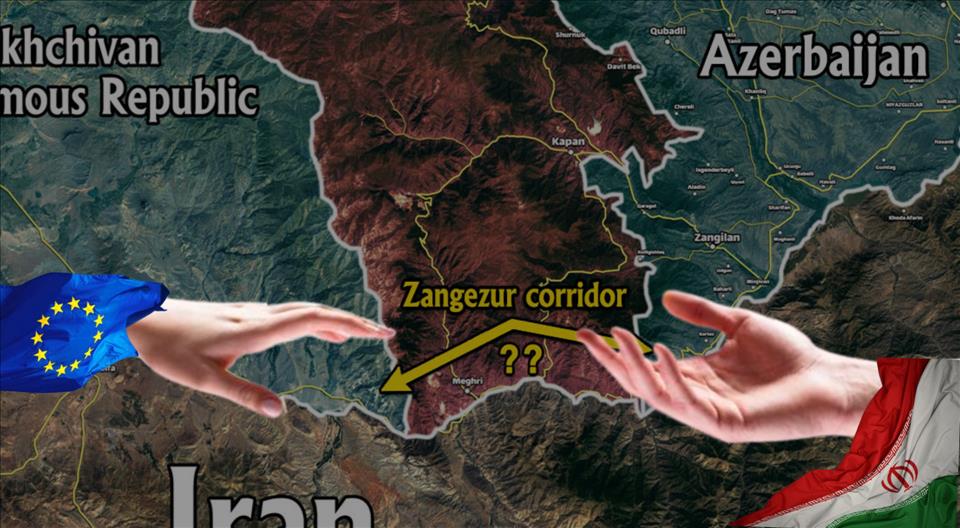
Iran's Concern Over Zangazur Corridor: Is Tehran Looking To Align With West?
The Zangazur Corridor holds great importance not only for Azerbaijan but also for many regional states, such as Turkiye, Russia, and even Armenia. The corridor has the potential to foster the development of trade and transportation connections, promote regional integration, and encourage economic cooperation.
However, the stance of certain countries, particularly Iran, on the Zangazur Corridor reflects their regional interests and strategic plans. Iran is aware of the corridor's potential impact on the region and seeks to maintain its position. Specifically, Tehran, worried that its relations with Armenia might weaken after the opening of the corridor, primarily directs its claims against Russia and continues to send subtle, indirect messages. Iran evades responding positively to Azerbaijan's proposals for peace, stability, and cooperation, including initiatives like the "3+3" platform, instead contributing to instability.
It is important to note that the Zangazur Corridor does not pose a threat to the territorial integrity of either Armenia or Iran. On the contrary, if Iran pursued a more reasonable policy, it could increase its role in this corridor. However, Iran's approach to the corridor's opening, its personalisation of the issue, and its illogical statements are unacceptable. We should recall that in the recent statement by the Iranian Ministry of Foreign Affairs, Russian President Vladimir Putin's visit to Baku was particularly noted, reflecting Iran's "concerns about destabilisation" in the region. This is simply ridiculous. For 30 years, when Azerbaijani lands were occupied by Armenia, Iran, despite claiming to share the same religion and values, refused to support Azerbaijan. Iran ignored the devastation in Garabagh, including the vandalism of mosques by Armenians. Now, it is strange that Iran opposes Azerbaijan's efforts to establish communication lines within its own territories.
It is clear that the main issue here is not regional peace, stability, or tranquillity. Iran openly realises that it is losing its influence over Armenia and is attempting to take out its frustrations on Russia. The only way to restore its relations with Armenia to their previous state is by aligning itself with the West, which appears to be Tehran's current plan. However, it remains unclear who is behind this plan. After a long period of silence, it is difficult to determine whether this strategy is being driven by Iran's new president or its supreme leader. In either case, Iran must accept the integration of Azerbaijan's western regions with Nakhchivan and the security of the resulting transportation corridor, as outlined in the trilateral statement, which will be ensured by Russia's Federal Security Service forces.
Considering that Russian Foreign Minister Lavrov's statements are entirely in line with the trilateral statement signed in 2020, it is evident that Iran is directly targeting this agreement. This further demonstrates that Iran is planning to align with the West by creating regional tension.
This situation highlights the uncertainties and strategic obstacles in Iran's foreign policy and complicates regional and international dynamics.
It should be noted that the Caucasus is already a region filled with tensions. The failure of peace negotiations between Azerbaijan and Armenia is reigniting the short-term calm that had been established. Armenia's failure to follow through on its peace promises while breaking the ceasefire along the border with Azerbaijan is testing Baku's patience.
Iran's desire to intervene in Azerbaijan-Armenia relations and its opposition to the opening of the corridor, as well as its attempts to encourage Armenia to align with the West, are shameful. For 30 years, Armenia committed countless crimes and atrocities against Azerbaijan in this region. Yet Iran never once condemned this disgrace. Now that Garabagh has been liberated and the opening of the Zangazur Corridor is on the agenda, Tehran is panicking, using the excuse that its "special" trade with Armenia will be restricted and that its economy will weaken, making statements that could escalate tensions once again.
Iran must understand that the issues being discussed between Azerbaijan and Armenia concern only those two countries. If Iran could turn a blind eye to the massacres that occurred on these lands for 30 years, just as it ignored Armenia's unjust stance, it should also refrain from interfering in other regional matters.
Legal Disclaimer:
MENAFN provides the
information “as is” without warranty of any kind. We do not accept
any responsibility or liability for the accuracy, content, images,
videos, licenses, completeness, legality, or reliability of the information
contained in this article. If you have any complaints or copyright
issues related to this article, kindly contact the provider above.


















Comments
No comment